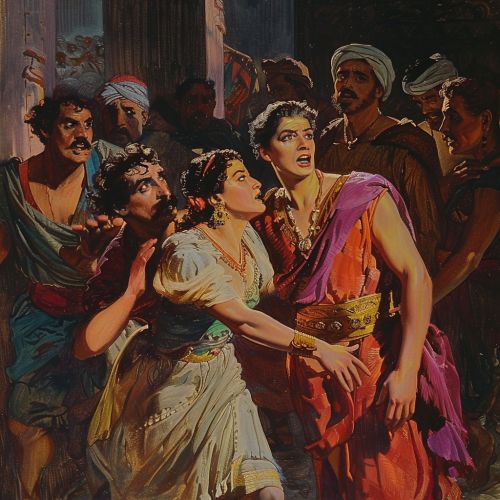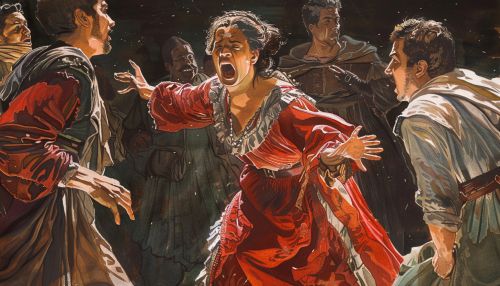Zaïre (play)
Overview
Zaïre is a five-act tragedy written by the French Enlightenment writer Voltaire. First performed in 1732, the play is set in the Ottoman Empire and explores themes of love, religion, and cultural conflict. Zaïre is notable for its complex characters and its exploration of religious tolerance, a recurring theme in Voltaire's works.
Plot Summary
The play centers around Zaïre, a Christian slave in the Ottoman Empire, who falls in love with Sultan Orosmane. Unbeknownst to her, she is the daughter of a French nobleman. The plot thickens as Zaïre's true heritage is revealed, leading to tragic consequences.
Act I
The play opens with Zaïre and her fellow slaves in the palace of Sultan Orosmane. Zaïre is in love with Orosmane, who reciprocates her feelings. However, the arrival of a French envoy, Nerestan, who is also a Christian, complicates matters. Nerestan reveals to Zaïre that she is actually the daughter of a French nobleman, captured as a child during a raid.
Act II
Zaïre is torn between her love for Orosmane and her newfound Christian identity. Nerestan urges her to embrace her Christian roots and return to France. Orosmane, unaware of Zaïre's internal conflict, plans to marry her and convert her to Islam.
Act III
The tension escalates as Orosmane becomes suspicious of Zaïre's relationship with Nerestan. He confronts her, and she confesses her Christian faith but assures him of her love. Orosmane is conflicted but decides to proceed with the marriage.
Act IV
On the eve of their wedding, Zaïre prays for guidance. Orosmane, still suspicious, intercepts a letter from Nerestan to Zaïre, which he misinterprets as evidence of infidelity. In a fit of rage, he confronts Zaïre and kills her.
Act V
Realizing his mistake, Orosmane is consumed by guilt and despair. Nerestan arrives too late to save Zaïre but reveals the truth to Orosmane. Overcome with remorse, Orosmane takes his own life.
Themes
Love and Betrayal
The central theme of Zaïre is the conflict between love and betrayal. Zaïre's love for Orosmane is genuine, but her loyalty to her Christian faith creates a rift between them. Orosmane's jealousy and misunderstanding lead to the tragic conclusion.
Religious Tolerance
Voltaire uses Zaïre to explore the theme of religious tolerance. The play highlights the destructive consequences of religious intolerance and the importance of understanding and accepting different beliefs.
Identity and Heritage
Zaïre's struggle with her identity and heritage is another key theme. Her discovery of her Christian roots forces her to confront her past and question her future. This internal conflict drives the plot and adds depth to her character.
Characters
Zaïre
The protagonist of the play, Zaïre is a Christian slave who falls in love with Sultan Orosmane. Her internal conflict between her love for Orosmane and her Christian faith drives the plot.
Orosmane
The Sultan of the Ottoman Empire, Orosmane is deeply in love with Zaïre. His jealousy and misunderstanding lead to the tragic conclusion of the play.
Nerestan
A French envoy and fellow Christian, Nerestan reveals Zaïre's true heritage and urges her to return to France. His actions, though well-intentioned, contribute to the tragic outcome.
Historical Context
Zaïre was written during the Age of Enlightenment, a period characterized by an emphasis on reason, science, and intellectual interchange. Voltaire, a leading figure of the Enlightenment, used his works to critique established norms and advocate for social reform. Zaïre reflects these ideals through its exploration of religious tolerance and cultural conflict.
Literary Significance
Reception
Upon its premiere in 1732, Zaïre was well-received by audiences and critics alike. The play's exploration of complex themes and its emotional depth resonated with contemporary audiences. It remains one of Voltaire's most performed plays.
Influence
Zaïre influenced subsequent works of literature and drama, particularly in its treatment of religious and cultural themes. The play's exploration of religious tolerance and cultural conflict can be seen in later works by other Enlightenment writers.
Performance History
18th Century
Zaïre was first performed at the Comédie-Française in 1732. The play quickly became popular and was performed regularly throughout the 18th century. Notable actors of the time, including Adrienne Lecouvreur, played the role of Zaïre.
19th Century
The play continued to be performed in the 19th century, though its popularity waned as tastes in drama evolved. However, it remained a staple of the French theatrical repertoire.
Modern Performances
In recent years, Zaïre has seen a resurgence in popularity, with modern productions exploring its themes in new and innovative ways. The play's exploration of religious and cultural conflict remains relevant in contemporary society.
Analysis
Character Development
Voltaire's characters in Zaïre are complex and multifaceted. Zaïre's internal conflict and Orosmane's jealousy are portrayed with emotional depth, making them relatable and compelling.
Use of Language
Voltaire's use of language in Zaïre is notable for its elegance and precision. The dialogue is rich in emotion and nuance, adding to the play's dramatic impact.
Symbolism
Zaïre employs various symbols to enhance its themes. The contrast between the Christian and Islamic faiths symbolizes the broader cultural conflict, while Zaïre's internal struggle represents the clash between personal desire and moral duty.
Adaptations
Opera
Zaïre has been adapted into several operas, most notably by Giuseppe Verdi in his early work I Lombardi alla prima crociata. These adaptations often emphasize the play's emotional and dramatic elements.
Film
The play has also been adapted into film, with various interpretations exploring its themes in different cultural contexts. These adaptations often highlight the timeless nature of Voltaire's exploration of love, identity, and religious tolerance.
Legacy
Zaïre remains an important work in the canon of French literature. Its exploration of complex themes and its emotional depth continue to resonate with audiences today. The play's influence can be seen in subsequent works of literature and drama, and its themes remain relevant in contemporary society.
See Also


